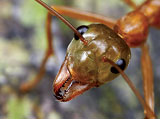How do you spell pest? Chances are good that you regard as pests those things that literally bug you.

photo by Alex Wild
|
For example, most of us think mosquitoes are pests. They bite, they cause itching, they may carry disease, and they whine in our ears when we lie abed, sleepless and sweaty, on a too-sultry summer night. Ticks, mites, fleas and biting flies all share these less-than-appealing traits.
Butterflies, on the other hand, are generally regarded as poetic pollinators, silken signs of summer, graceful, carefree and attractive. Being an occasional shopper for gift earrings, I can attest that while butterflies are ubiquitous, mosquitoes are scarce in the jewelry department.
But mosquito larvae are an essential component of the aquatic food chain — the ecosystem that supports all life on earth — while many butterfly larvae are voracious despoilers of food crops. As the old sports adage has it, “Hard to tell the players without a scorecard.”
For that matter, it’s hard to trust a scorecard without some understanding of its provenance. This column, for example, is chock full of information and opinion, but I have no particular stake in selling you my ideas — other than my hope to live in a less toxic world. Other scorecards of bugginess emanate from more subjective sources.
At this time of year, the airwaves are full of pest-control advertising from poison peddlers eager to kill anything that crawls. Worse yet, they work to convince us of the pestilence of beneficial bugs in order to sell us their wares.
Ants, for example, are painted as horrific invaders of hearth and home. We are offered baits that the stalwart little workers will cart back to their nests in order to poison their entire community, including the queen. But what, exactly, is the problem with ants? Ants are foragers. They clean up organic detritus and recycle it into the soil. While ants may be more attracted to dirty homes, homes with active ants are arguably cleaner than those without, because the scuzz is being carted away. If you have more ants in your home than you would prefer, more attentive cleaning is the answer, not poisoning the cleaning crew that marches in to help out.
Even the much maligned carpenter ant only tunnels into damp wood. If there are carpenter ants in your rafters, what you have is a leak. Poison doesn’t stop leaks.
Spiders are another ally that pest-control companies offer to exterminate. Work with me on this: Spiders eat flying insects, including flies and mosquitoes. Flies and mosquitoes are disease vectors. Whose side is the spider on?
While few people have great fondness for wasps and hornets, they too constitute an unfairly uglified set of allies. Yes, they can sting, and some people are deathly allergic to some of their number, but for the great majority of humans, these insects are a valuable asset. If you doubt me, simply watch paper wasps flying home to their nests. Each returning worker carries a limp caterpillar, probably plucked from your favorite rose bush or broccoli patch. Or check out the carcass of a deceased songbird or rodent in your yard, where yellow jackets are busily recycling dead flesh into the biome.
No, I don’t want termites in my floor joists — though termites, too, have their function in the food chain, turning dead trees into compost — just as I don’t want rats in my larder or the NSA in my bank and phone records. But while a handful of such creatures are, on balance, evil, most of the rest of the natural world is decidedly beneficial.
Besides, the spider that lives on my kitchen windowsill is kind of cute.



Before you comment
The comments section is here to provide a platform for civil dialogue on the issues we face together as a local community. Xpress is committed to offering this platform for all voices, but when the tone of the discussion gets nasty or strays off topic, we believe many people choose not to participate. Xpress editors are determined to moderate comments to ensure a constructive interchange is maintained. All comments judged not to be in keeping with the spirit of civil discourse will be removed and repeat violators will be banned. See here for our terms of service. Thank you for being part of this effort to promote respectful discussion.